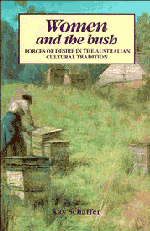Book contents
- Frontmatter
- Contents
- ACKNOWLEDGEMENTS
- INTRODUCTION
- Dedication
- CHAPTER 1 CULTURE, LANGUAGE AND THE SELF
- CHAPTER 2 IN SEARCH OF A NATIONAL IDENTITY
- CHAPTER 3 THE BUSH AND WOMEN
- CHAPTER 4 LANDSCAPE REPRESENTATION AND NATIONAL IDENTITY
- CHAPTER 5 HENRY LAWSON: THE PEOPLE'S POET
- CHAPTER 6 BARBARA BAYNTON: A DISSIDENT VOICE FROM THE BUSH
- CHAPTER 7 CONCLUSION
- NOTES
- BIBLIOGRAPHY
- INDEX
CHAPTER 6 - BARBARA BAYNTON: A DISSIDENT VOICE FROM THE BUSH
Published online by Cambridge University Press: 10 January 2011
- Frontmatter
- Contents
- ACKNOWLEDGEMENTS
- INTRODUCTION
- Dedication
- CHAPTER 1 CULTURE, LANGUAGE AND THE SELF
- CHAPTER 2 IN SEARCH OF A NATIONAL IDENTITY
- CHAPTER 3 THE BUSH AND WOMEN
- CHAPTER 4 LANDSCAPE REPRESENTATION AND NATIONAL IDENTITY
- CHAPTER 5 HENRY LAWSON: THE PEOPLE'S POET
- CHAPTER 6 BARBARA BAYNTON: A DISSIDENT VOICE FROM THE BUSH
- CHAPTER 7 CONCLUSION
- NOTES
- BIBLIOGRAPHY
- INDEX
Summary
A woman is a perpetual dissident as regards the social and political consensus … woman is here to shake up, to disturb, to deflate masculine values, and not to espouse them.
Julia Kristeva, PolyloguesWhen critics like A. A. Phillips speak of the Australian tradition in terms of its ‘fervent celebration of a robust nationalism’ represented by the fiction of Democratic Nationalism in the 1890s, they seldom think of the writings of women. Phillips, however, in his 1966 revised edition of The Australian Tradition, included a new chapter on Barbara Baynton, author of Bush Studies (1902). The inclusion of Baynton in the revised edition is significant. It brings to the attention of readers and students of the Australian tradition a writer whose fierce but short-lived talent had been overlooked and all but lost. Phillips applies the label ‘dissidence’ to the character of Baynton's writing, along with that of Miles Franklin's My Brilliant Career, Norman Lindsay's Redheap, Arthur Adams' poem ‘The Australian’ and some of the short stories of Henry Lawson, like ‘The Union Buries its Dead’. He writes that they exhibit an ‘undercurrent of revolt against the barbaric fate of being an Australian’. The issue is not woman's fate, but that of ‘being an Australian’. Nonetheless, the manner in which this so-called dissidence is approached has relevance in the light of contemporary theoretical questions concerning the relationship between culture, writing and gender.
- Type
- Chapter
- Information
- Women and the BushForces of Desire in the Australian Cultural Tradition, pp. 148 - 170Publisher: Cambridge University PressPrint publication year: 1989



